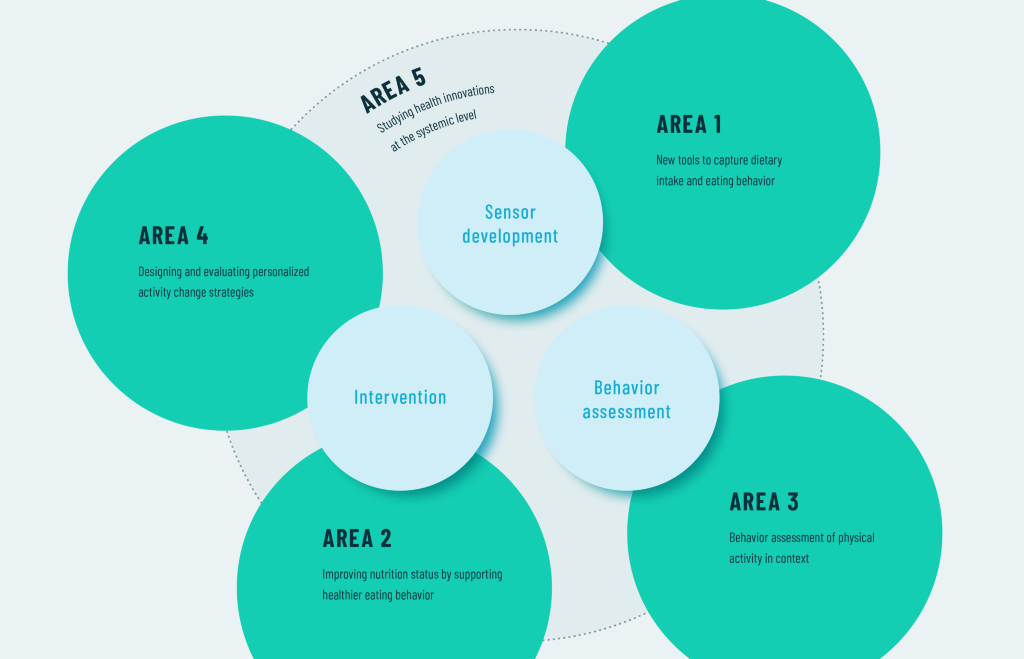
Area 1
“New tools to capture dietary intake and eating behavior”
Lead: Elske Brouwer (WUR); Juliet Haarman (UT)
Team: Guido Camps; Marlou Lasschuijt
Current dietary assessment methods are time-consuming and prone to bias. We aim to contribute to the scientific basis for recent technology-based innovations that provide opportunities to simplify the reporting of the dietary intake and increase its accuracy, e.g., by using voice recording and image or video processing in smartphone apps.
In addition, we develop tools that study aspects of eating behavior in a non-obtrusive way using various types of sensors and registration tools. They allow us to measure a variety of eating behavior parameters (number of bites, eating rate, number of chews, mass distribution of food, experienced emotions, and so on) that may be relevant in explaining eating patterns. Because eating is often a social activity, we also take the effects of interpersonal interactions into account.
Area 2
"Improving nutrition status by supporting healthier eating behavior"
Lead: Ellen van Loo (WUR); Boudewijn Boon (TUD)
Team: Merijn Bruijnes; Juliet Haarman; Mailin Lemke; Monique Simons; Roelof de Vries
We develop novel interventions that affect the determinants of food consumption in order to support people in developing and maintaining a healthier eating pattern. With regard to food purchasing, we study and try to influence people’s behavior in food stores, both in physical and online environments, exploring approaches using personalized advice, gamification, and others. We also create interventions that affect how and what people eat at home, in restaurants, or in public. We explicitly consider how people’s eating behavior is affected by their cultural background, the built environment, societal challenges, their family and friends, and the technology that connects them.
Area 3
“Behavior assessment of physical activity in context”
Lead: Carine Lallemand (TUe); Jos Kraal (TUD)
Team: Max Birk; Rúben Gouveia; Günter Wallner
We develop tools and methods to assess behavior related to physical activity. First, we look at different ways to assess physical activity in context, for different user groups. Although we mainly make use of existing sensors, we will look for innovative ways to combine different on-, and off-body sensors and integrate the data of different sensors. With these combinations, we aim to improve the accuracy, reliability and ecological validity of the measurements. Second, we look for measures that are related with the physical activity of users. We look for innovative ways to assess behavior such as sedentary, exercise, stress and sleep behavior, but also analyze cognitive and affective behavior such as emotion, motivation, experience and self-efficacy. For each project, we will identify which measures are appropriate to assess, and relate them to physical activity behavior. The activities in this work area are strongly related to the activities in work area 4.
Area 4
“Designing and evaluating personalized activity change strategies”
Lead: Rúben Gouveia (UT); Max Birk (TUe)
Team: Merijn Bruijnes; Jos Kraal; Carine Lallemand; Monique Simons; Günter Wallner
We design and evaluate interventions that support people in engaging with personalized physical activity goals. We design interventions that help individuals in identifying their activity goals and stimulate the negotiation and commitment to goals between system and user. To this end, we support self-experimentation with goals by collecting contextual information (e.g., weather, calendar entries), motivational factors (e.g., self-regulation, motivation for physical activity), and self-understanding (e.g., training expertise, prior experience with times of low motivation or difficult life events).
We aim to evaluate the effects of personalized training tools on adherence to a training regime and investigate common personalization strategies. We see particular potential in longitudinal, in-situ evaluations, as it is well known that people often quickly relapse into old habits when they try to change their behavior. And even when people persist, their motivations are likely to change over different contexts and time.
Area 5
“Studying health innovations at the systemic level”
Lead: Marina Bos de Vos (TUD); Bas de Boer (UT)
On the institutional level, it is often said that healthcare innovations aiming for behavior change empower citizens to take responsibility for their own health through lifestyle change. However, it is often unclear what exactly citizens are intended to take responsibility for and how different actors in the health ecosystem can stimulate and support this process. In this area, we reflect on the conception of health and the different values that underlie how eating behavior and physical activity are assessed and intervened upon. We are interested in revealing how the envisioned forms of behavior change embody a specific understanding of health. In addition, we want to evaluate to what extent these forms coincide with how users understand their health status. We also aim to unravel the complex web of interrelated values that play a role in health innovations, taking into account both the ideals that people/organizations have and the different dimensions of value they aim to realize. We envision that awareness of the potentially different ways in which health is understood and how the values of involved actors complement or compete with each other can lead to better alignment of the concerns of users, healthcare professionals, government and others.



